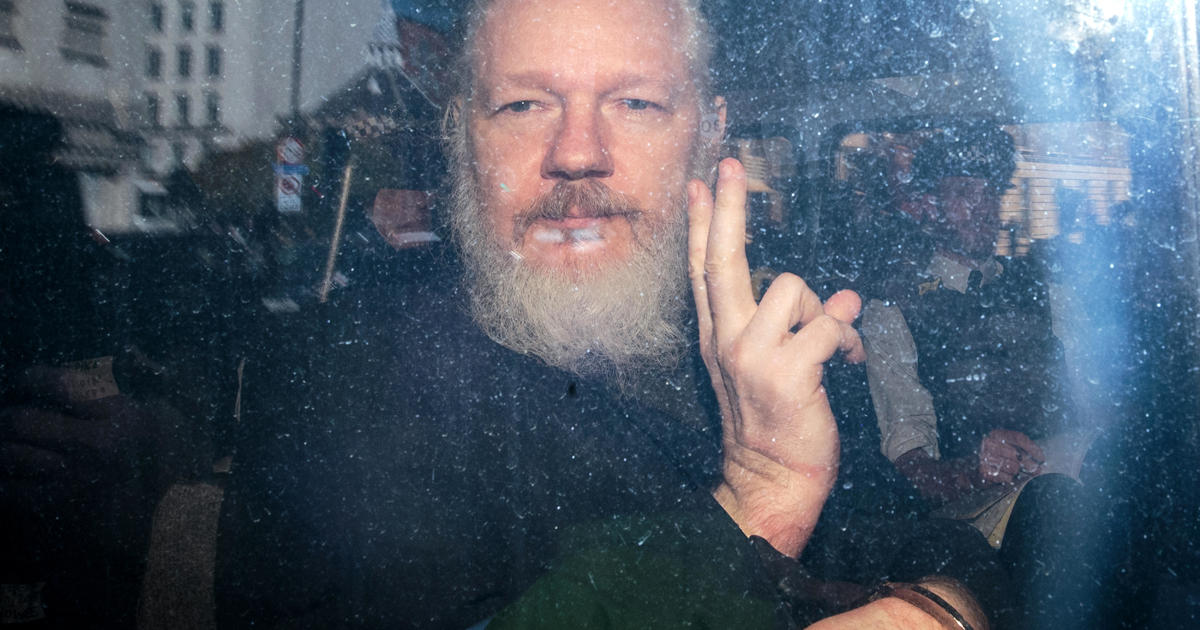Washington — WikiLeaks founder Julian Assange has agreed to plead guilty to violating the Espionage Act and is expected to appear in a U.S. courtroom on the Northern Mariana Islands in the coming days, court records revealed Monday.
The guilty plea, which is to be finalized Wednesday, will resolve Assange’s outstanding legal matters with the U.S. government. Justice Department prosecutors recommended a prison sentence of 62 months in custody as part of the plea agreement, the records revealed, which is on the high end for a single-count violation. Assange would not spend any time in U.S. custody because, under the plea agreement, he’ll receive credit for the approximately five years he has spent in a U.K. prison fighting extradition to the U.S.
Assange, an Australian national, was indicted in 2019 by a federal grand jury in Virginia with more than a dozen charges that alleged he illegally obtained and disseminated classified information about America’s wars in Afghanistan and Iraq on his WikiLeaks site. Prosecutors at the time accused him of recruiting individuals to “hack into computers and/or illegally obtain and disclose classified information.”
He is set to plead guilty to a charge of conspiracy to obtain and disclose national defense information.
One of his best-known recruits, U.S. Army intelligence analyst Chelsea Manning, was convicted of the 2010 leak of hundreds of thousands of sensitive military records to WikiLeaks in what officials said was one the largest disclosures of secret government records in history. Manning was sentenced to 35 years in prison and in 2017, former President Barack Obama commuted her sentence.
Assange was accused of working with Manning to figure out the password on a Defense Department computer system that stored the sensitive records about the Iraq and Afghanistan wars as well as hundreds of Guantanamo Bay detainee assessment briefs.
Federal prosecutors also accused Assange of publishing the names of “persons throughout the world who provided information to the U.S. government in circumstances in which they could reasonably expect that their identities would be kept confidential.”
Assange previously denied all wrongdoing. He has been in British custody since 2019 and launched a yearslong legal effort to resist extradition to the U.S. to face federal charges. The expected guilty plea brings an end to the intercontinental court fight.
In May, the WikiLeaks founder won his bid to appeal his extradition to the U.S. on espionage charges after a British court asked the U.S. government earlier this year to assure that Assange would be granted free speech protections under the U.S. Constitution and that he would not be given the death penalty if convicted on espionage charges.
President Biden said in April he was “considering” a request from Australia to allow Assange to return to his native country, which called for the U.S. to drop the case against him.
Assange has faced legal troubles for more than a decade, beginning in 2010 when a Swedish prosecutor issued an arrest warrant related to rape and sexual assault allegations by two women, which Assange denied. As he faced extradition to Sweden, he sought political asylum at the Ecuadorian Embassy in London, where he lived for seven years until he was evicted in 2019.
Swedish prosecutors dropped their investigation into Assange in 2017 and an international arrest warrant against him was withdrawn, but he was still wanted by British police for skipping bail when he entered the embassy.
By early 2019, Ecuador became irritated with its London house guest, accusing him of smearing his feces on the walls and attacking its guards.
“He exhausted our patience and pushed our tolerance to the limit,” Lenin Moreno, who was Ecuador’s president at the time, said. Moreno accused Assange of being “an informational terrorist” by selectively releasing information “according to his ideological commitments.”
At the request of the U.S. government, British police arrested Assange on April 11, 2019, at the embassy after Ecuador ended his asylum. By then, he was facing charges in the U.S. related to the 2010 leak.
WikiLeaks was a key player in the 2016 presidential election, publishing thousands of emails from Hillary Clinton’s campaign and the Democratic National Committee that had been stolen by Russian government hackers. WikiLeaks and Assange are mentioned hundreds of times in special counsel Robert Mueller’s 448-page report on Russian interference in the 2016 election.
Priscilla Saldana contributed reporting.
